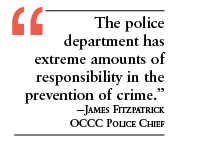Clery Act born from ’86 dorm room crime

In 1986, Connie and Howard Clery got a call telling them their college-aged daughter Jeanne was dead.
The 19-year-old had been raped and murdered by a fellow student in her dorm room at Lehigh University in Pennsylvania.
During the ensuing investigation, it was discovered there had been several dozen violent crimes at that campus in the prior three years. The Clerys said, had they known that information, they would not have sent their daughter there.
OCCC Police Chief James Fitzpatrick said, subsequently, the Jeanne Clery Disclosure of Campus Security Policy and Campus Crime Statistics Act or, the Clery Act, was born in 1990.
“They named it after Jeanne Clery because it was her parents who initiated this push for more openness and transparency as to what’s going on on any campus that accepts federal dollars,” Fitzpatrick said. “They just felt like more needed to be done on campus safety.”
According to http://clerycenter.org, “The Clery Act requires colleges and universities to disclose their security policies, keep a public crime log, publish an annual crime report and provide timely warnings to students and campus employees about a crime posing an immediate or ongoing threat to students and campus employees.
“The law also ensures certain basic rights for victims of campus sexual assaults and requires the U.S. Department of Education to collect and disseminates campus crime statistics.”
Fitzpatrick said OCCC’s police department is required to release an Annual Security Report every year on Oct. 1.
The report must include information about crime statistics for the past year, as well as information about school’s legal policies involving crimes on campus.
“It’s a very comprehensive document on campus safety,” he said. “There are crime statistics in the Annual Security Report, but I’m not really sure that is the main emphasis of the Annual Security Report. It also requires policy statements. They want to know what the institutions do, what is their practice.
“What the Clery Act wants in the Annual Security Report is what we practice, what we do in case something happens,” he said. “Some of that stuff is required as to how you perform and what actions you will take under the circumstances of a crime occurring on campus or an emergency situation.”
Fitzpatrick said that includes how the university or college would handle complaints of certain crimes, what they would do in the case of having a sexual assault, what preventative measures are suggested, how information is distributed and how to access that information, and how they work with the Oklahoma City Police Department.
He said new requirements are added every few years as the Clery Act is amended.
Amendments such as the Campus Sexual Violence Elimination Act of 2013, and the Violence Against Women Act of 2013 have added significant requirements to the report about sexual assault and domestic abuse, Fitzpatrick said.
He said notifications about crimes and safety on campus also are required by the Clery Act, in the form of timely warnings and emergency notifications.
“When we put out a tornado warning or things like that, that is an emergency notification,” he said.
“We do that when there is an immediate threat to the safety of our students, and it doesn’t have to be related to a Clery-type crime. It could be a gas leak, a fire alarm in the buildings, criminal behavior, or even weather.
 “A timely warning is something that is specifically required by the department of education to Clery-type crimes, that we have to report to them.
“A timely warning is something that is specifically required by the department of education to Clery-type crimes, that we have to report to them.
“If we have information which was given to us by the Oklahoma City Police Department that someone had been sexually assaulted on campus, we would put out a timely warning, telling when and where it happened, and any information we know about the suspect.
“We would be doing that anyway, but the Clery Act requires it.”
Fitzpatrick said an example of a timely warning would be the June 4 email that was sent to students informing them that multiple cars had been stolen on campus within days of each other. He said that was sent to make students aware, cautious, and more safe.
Fitzpatrick said students have a right to know about campus activity and policies.
“I cannot think of any time in my four-and-a-half years here, where someone was just beaten, and robbed,” he said. “And that takes preventative measures on the part of our students.
“For example, a stolen phone is important. They are expensive, and many times people keep personal information on them. So we tell students, don’t give anyone your password, don’t leave your phone around, etc.
“The police department has extreme amounts of responsibility in the prevention of crime. Just taking reports and reacting to crime is not the mission. We are out there to actually prevent crime.”
Fitzpatrick said the Clery Act is an important part of keeping students safe.
“You cannot interfere with someone’s right to an education,” he said.
“Each institution is responsible for handling crime, taking immediate measures to stop whatever is going on, and putting sanctions in place to prevent it.”
For more information on the Clery Act and related acts, or to file a Clery related complaint, visit www.cleryact.info. To learn more about OCCC’s compliance to the Clery Act, or report a crime, contact campus police at 405-682- 7872, or email jfitzpatrick@occc.edu.
